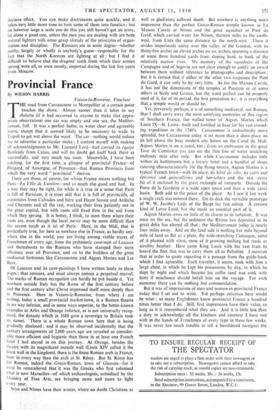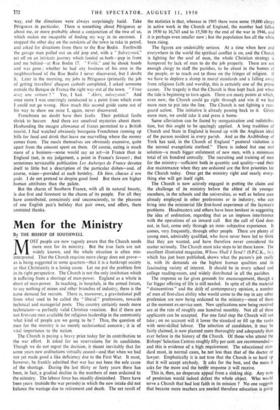Provincial France
By WILSON HARRIS Vaison-la-Romaine, Vaucluse
THE road from Carcassonne to Montpellier at a certain point touches the shore. Almost sooner than it takes to say thalatta (if it had occurred to anyone to make that appro- priate observation) one car was empty and one sea, the Mediter- ranean, full. It was a perfect bathe, in water clear and agreeably warm, except that it seemed likely to be necessary to wade to Tripoli to get wet above the waist. The oar—nothing would induce me to advertise a particular make ; I content myself with making all acknowledgments to Mr. Leonard Lord—had carried its Equipe flawlessly from Calais, and will no doubt get itself back there as successfully, and very much too soon. Meanwhile, I have been catching, for the first time, a glimpse of provincial France—of Perigord, of Auvergne, of Provence—that Roman Provincia from which the very word " provincial " derives.
There are those, of course, for whom France means nothing but Paris—La Ville de Lumiere—and so much else good and bad. In a way they may be right, for while it is true in a sense that Paris is full of Parisians, it is truer still that it is full of provincials, of expatriates from Calvados and Isere and Haute Savoie and Ardeche and Charente and all the rest, working their lives patiently out in the great capital, but with roots still fixed firm in the soil from which they sprung. It is better, I think, to meet them where their roots are, even though the local patois may be more difficult than the accent (such as it is) of Paris. Here, in the Midi, that is particularly true, for here as nowhere else in France, as hardly any- where else in the world, you are living among visible traces of Frenchmen of every age, from the prehistoric cave-men of Lascaux and thereabouts to the Romans who have stamped their stern efficiency over all Provence, and on to the builders of the great mediaeval fortresses like Carcassonne and Aigues Mortes and Les 13a ux.
Of Lascaux and its cave-paintings I have written lately in these pages ; that remains, and must always remain a perpetual marvel. The marks of Roman occupation can hardly be put beside it. Yet nowhere outside Italy has the Rome of the first century before and the first century after Christ impressed itself mere deeply than in Provence. Here in Vaison-le-Romaine, from where I am writing, today a small provincial market-town, is a Roman theatre in no way inferior, and in some ways superior, to the better-known examples at Arles and Orange (whence, as is not universally recog- nised, the dynasty which in 1688 gave a sovereign to Britain took its name). There is a whole Roman town here that is being gradually disclosed ; and it may be observed incidentally that the sanitary arrangements of 2,000 years ago are revealed as consider- ably more efficient and hygienic than those in at least one French hotel I had stayed in on this journey. At Orange, besides the theatre with its magnificent outside wall (Louis XIV called it the finest wall in the kingdom), there is the finest Roman arch in France, finer in every way than the arch at St. Remy. But St. Remy has the Roman, indeed the Greco-Roman, town of Glanum—for it must be remembered that it was the Greeks who first colonised what is now Marseilles—of which archaeologists, subsidised by the Ministry of Fine Arts, are bringing more and more to light every year.
Arles and Nimes have their arenas, where no doubt Christians as
well as gladiators suffered death. But nowhere is anything more impressive than the perfect Greco-Roman temple known as La Maison Carree at Nimes and the great aqueduct at Pont du Gard, which carried water for Nimes, thirteen miles to the south- west, from Uzes the same distance to the north-west. There it strides imperiously today over the valley of the Gardon, with its thirty-five arches on eleven arches on six arches, spanning a distance of some three hundred yards from sloping bank to bank of the relatively narrow river. My memory of the aqueducts of the Campagna and of Segovia are not clear enough to justify an award between them without reference to photographs and description ; but it is certain that if either of the other two surpasses the Pont du Gard, it can only be by very little. As for the Maison Carree, it has not the dimensions of the temples at Paestum or of some others in Sicily and Greece, but the word perfect can be properly used of it, for of its period, the first generation B.C., it is everything that a temple would or should be.
Yet, perversely perhaps, it is of something mediaeval, not Roman, that I shall carry away the most satisfying memories of this region of Southern France, the walled town of Aigues Mortes which Louis IX—St. Louis—built and fortified as base for his vast crusad- ing expedition in the 1240's. Carcassonne is undoubtedly more splendid, but Carcassonne today is no more than a show-place on its hill above the busy modern city below on the Canal du Midi. Aigues Mortes is on a canal, too ; from an embrasure in the great Tour de Constance you can see the thin line of water stretching endlessly mile after. mile. But while Carcassonne includes little within its battlements but a luxury hotel and a handful of shops catering characteristically for the flying tourist, Aigues Mortes is a typical French town—with its place, its hotel de ville, its cafés and Epiceries and quincailleries and bar-tabacs and the rest—every bit of it enclosed by the great rectangle of ramparts. Outside the Porte de la Gardette is a wide open space and then a wide canal basin. Both add to the peace of the place. As I saw it last week a single craft was moored there. On its deck the veritable prototype of W. W. Jacobs's Lady of the Barge lay fast asleep. A curious kind of Lotus Land, but she made an essential part of it.
Aigues Mortes owes no little of its charm to its isolation. It was once on the sea, but the sediment the Rhone has deposited in its great delta has altered all that ; the Mediterranean today is nearly four miles away. And on the land side is nothing but mile beyond mile of land as flat as a plate, the wide-stretching Camargue, some of it planted with vines, most of it growing nothing but reeds or scrubby heather. Here came King Louis with his vast train to board the fleet that was to carry them all to Palestine. I mention that in order to quote regarding it a passage from the guide-book which I find agreeable. Each traveller, it seems, took with him a large chest, in which he kept his possessions by day, in which he slept by night and which became his coffin (and was sunk with him) if mischance should befall him on the voyage. For such economy there can be nothing but commendation.
But it was of impressions of men and women in provincial France today that I set' out to write. Yet perhaps reticence here would be wiser ; so many Englishmen know provincial France a hundred times better than I do. Still, first impressions have their value, so long as it is remembered what they are. And it is little less than a duty to acknowledge all the kindness and courtesy I have met with at the hands of Frenchmen of every type in these few weeks. It was never too much trouble to tell a bewildered foreigner the
way, and the directions were always surprisingly lucid. Take Perigueux in particular. There is something about Perigueux or about me, or more probably about a conjunction of the two of us, which makes me incapable of finding my way in its environs. I stopped the other day on the outskirts of the town to take in petrol, and asked for directions from there to the Rue Bodin. Forthwith the garage man pulled out an old jeep and, with a " Suivez-moi," set off on an intricate journey which landed us both—jeep in front and me behind—at Rue Bodin 17. " Voila." and he shook hands and was gone ; whether he had any business of his own in the neighbourhood 'a the Rue Bodin I never discovered, but I doubt it. Later in the morning, my jobs in Perigueux (primarily the job of getting travellers' cheques cashed) completed, I asked someone outside the Banque de France the right way out of the town. " Vous avez une voiture ? " Yes, I had. Alors, suivez-tnoi." And once more I was unerringly conducted to a point from which even I could not go wrong. How much this second guide came out of his way to show me mine I, again, never discovered.
Frenchmen no doubt have their faults. Their political faults shriek to heaven And there are unsolved mysteries about them. Husbanding the meagre allowance of francs permitted to a British tourist, I had watched obviously bourgeois Frenchmen running up bills for food and drink that leave me marvelling where the money comes from. The meals themselves are obviously excessive, quite apart from the amount spent on them. Of course, eating is much more of a business—some would say an art—in France than in England (not, in my judgement, a point in France's favour) ; that sometimes serviceable publication Les Auberges de France devotes itself to little but a description of the particular dishes—and, of course, wines—provided at each hostelry. Eh bien, chacun a son goat. I do not pretend to despise good food But there are higher human attributes than the palate.
But the charm of Southern France, with all its natural beauty, is due first and foremost to the charm of -its people. For all they have contributed, consciously and unconsciously, to the pleasure, of one English pair's holiday that pair owes, and offers, them unstinted thanks.



































 Previous page
Previous page